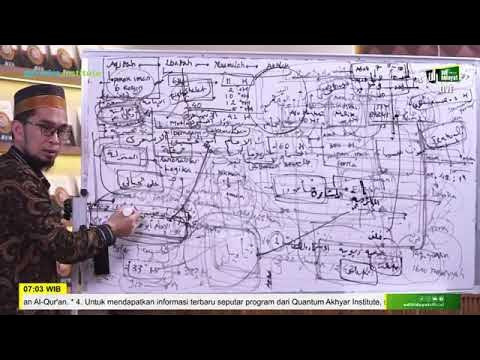Sejarah perkembangan dakwah salaf || Ustadz Abu Haidar As-sundawi
Summary
TLDRIn this transcript, Ustadz Badrusalam addresses questions about the Salafi methodology in Islam and its recent prominence. He explains that the Salafi approach emphasizes returning to the practices of the earliest Muslims, or 'Salaf,' and has been present in Indonesia for over a century, though its teachings have become more widespread recently. He attributes this to an increase in educated preachers and a response to earlier Islamic movements. Badrusalam also clarifies misconceptions about Salafism, emphasizing its roots in authentic Islamic teachings and its distinction from extremist interpretations.
Takeaways
- 🕌 The speaker emphasizes the completeness of Islam and the need to follow the Salaf method, without adding innovations.
- 📜 There is confusion about the Salaf method because it has only recently become more widely discussed and promoted.
- ⏳ The speaker mentions their personal experience of not hearing about the Salaf method until two years ago, despite being 57 years old.
- 📚 Historically, the Salaf method existed but was not widely known or taught, leading to misconceptions and lack of awareness.
- 🕌 The speaker references the establishment of Muhammadiyah and other organizations that claimed to follow Salaf teachings, but with differences in understanding and practice.
- 📖 Salaf teachings emphasize following the practices and beliefs of the early Islamic scholars and avoiding innovations that deviate from these teachings.
- 📢 The spread of Salaf teachings increased in the late 80s and 90s, with more books and materials becoming available, especially from Saudi Arabia.
- 🌍 The Salaf movement faced opposition due to its differences with mainstream Islamic practices in Indonesia, which were influenced by other movements and ideologies.
- 📖 The speaker highlights the importance of understanding and following the correct teachings of Salaf, emphasizing the role of scholars and proper knowledge.
- 🚫 The speaker warns against misinterpreting or labeling the Salaf method as extreme or associated with terrorism, stressing the need for accurate understanding and avoiding generalizations.
Q & A
What is the primary concern of the speaker in the transcript?
-The speaker is concerned about the recent rise in the Salafist movement and its impact on traditional Islamic practices in Indonesia.
How does the speaker describe the spread of Salafism in Indonesia?
-The speaker explains that Salafism has spread more widely in recent times due to increased efforts in spreading the teachings and the availability of more resources, despite it being present in a smaller form previously.
What historical context does the speaker provide about Salafism in Indonesia?
-The speaker mentions that the concept of Salafism in Indonesia has been around for over 100 years, initially associated with Muhammadiyah and aimed at countering other emerging Islamic movements.
Why does the speaker believe the Salafist teachings are gaining more attention now?
-The speaker attributes the recent attention to the strong arguments and evidence supporting Salafist teachings from the Quran, Hadith, and statements of early scholars, leading more people to recognize its validity.
What challenges does the speaker highlight regarding the acceptance of Salafist teachings?
-The speaker notes that there has been significant resistance due to differences in beliefs and practices, and because many people have been influenced by other Islamic movements and ideologies.
How does the speaker differentiate between Salafism and other Islamic practices?
-The speaker differentiates Salafism by emphasizing its strict adherence to the teachings and practices of the early generations of Muslims, as opposed to other practices that may include innovations or different interpretations.
What does the speaker say about the perception of Salafists in the wider community?
-The speaker acknowledges that Salafists are often perceived negatively, being associated with harshness, extremism, and even terrorism, but clarifies that these perceptions are based on misunderstandings and generalizations.
What is the speaker's view on the role of education in understanding Salafism?
-The speaker believes that proper education and understanding of Salafist teachings can dispel many misconceptions and demonstrate the truth and correctness of these teachings.
How does the speaker address the issue of labeling and accusations within the Muslim community?
-The speaker stresses the importance of not hastily labeling or accusing others of being heretics or disbelievers without thorough knowledge and understanding, emphasizing the need for careful consideration and evidence.
What advice does the speaker give to those who are new to Salafist teachings?
-The speaker advises newcomers to seek knowledge from credible sources, understand the teachings deeply, and not be swayed by negative portrayals or misconceptions about Salafism.
Outlines

This section is available to paid users only. Please upgrade to access this part.
Upgrade NowMindmap

This section is available to paid users only. Please upgrade to access this part.
Upgrade NowKeywords

This section is available to paid users only. Please upgrade to access this part.
Upgrade NowHighlights

This section is available to paid users only. Please upgrade to access this part.
Upgrade NowTranscripts

This section is available to paid users only. Please upgrade to access this part.
Upgrade NowBrowse More Related Video

Perbedaan MUHAMMADIYAH, NU dan SALAFI, Awas Jangan Sampai Gagal Paham !! Ustadz Adi Hidayat

Sunnii: Al-Asy'arii, Al-Maaturiidii, dan Ibnu Taimiyyah - Ustadz Dr. (HC) Adi Hidayat, Lc., M.A.

Eps 288 | MEMBEDAH SISTEM KEKHALIFAHAN ISLAM

TIDAK IKUT MAZHAB MAYORITAS | Ustadz Abu Yusuf Akhmad Jakfar, Lc.

Jangan Zalim

Bagaimana Tau Taubat kita di Terima Ustadz? | Ustadz Abdul Somad
5.0 / 5 (0 votes)